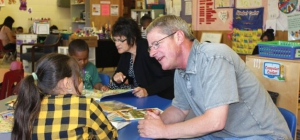
Royal City School District Superintendent Rose Search and Cliff Plath of Washington Fruit and Produce Company visit the Growing Great Learners preschool during a reading session.
Photo courtesy of Educational Service District 105
Washington Fruit helped create the Growing Great Learners program in 2010 to serve preschool-aged children in Royal City, Washington, the home of many of the people who work in the company’s thousands of acres of apple orchards on the Royal Slope and Frenchman Hills. The program enrolls children who are likely to have the greatest challenges in learning the basic skills needed to be prepared for kindergarten, first grade, and beyond. Many of the approximately 60 children in the program are from families employed by Washington Fruit.
“I saw young children playing around the rural parts of the community and found there wasn’t much of a preschool program available for most of them,” said Washington Fruit Vice President and Farm Manager Cliff Plath. He believed there needed to be a plan to help get them started in their education and thought that the whole program from kindergarten though 12th grade could benefit from helping preschoolers be better prepared. The Royal School District had the same concerns.
Hoping to provide a way for those children to have the same opportunities that his own children had, Plath approached the offices of Yakima’s Educational Service District—just a few blocks down the street from Washington Fruit’s main facilities—with his interest in supporting the start-up of a preschool at Royal City. After the ESD connected Plath with the Royal School District in 2009, educators from both sites developed a plan to launch a preschool and to develop lesson plans that day-care providers could use. The instructional materials are designed to flow into what students will learn when they enter the regular Royal City school system.
Washington Fruit funds bus transportation for the students, wages for their teachers, food for breakfasts and lunches, and equipment such as books and furniture, at no costs to the parents. Funds also support the assistance of staff from Yakima’s ESD 105 to provide curriculum training and monitor the children’s learning progress.
Homework
Two different groups of children attend preschool in the basement of Royal City’s Methodist church for two full days each week during the school year. A summer program was added this year. Activities include handwriting, counting, housekeeping, science, art, reading, and music. The children also learn to obey teacher instructions and develop social skills.
“These are the skills they need for kindergarten,” says Jeannie Enriquez, the preschool director for Growing Great Learners. “The parents participate a lot with us, because we send the kids home with homework, like practice pages with what we’re doing during the day. And, if we don’t send homework, the parents call us and tell us they didn’t get homework.”
Carolyn Bunch, Royal School District’s grants manager, said that before the program existed, kindergarteners began their education with some big hurdles, but that has changed. “Our kindergarten teachers now know our preschoolers will be coming in with many more skills than what they’re used to seeing,” she said. “The kids are not going to begin school with a deficit, and that’s a huge thing.”
ESD 105 Early Learning Programs Director Cynthia Juarez said that because the preschool program is getting children to achieve higher levels of learning, the teachers need to make some adjustments to their curriculum. “They’re increasing the quality of instruction that’s happening in those classrooms. When that happens, it has that domino effect to the next level.”
Lexi Catlin, who trains teachers and child-care providers on how to help children develop language skills and learn the alphabet, provides updates to Plath on the strides being made by the children in the program. Plath visits the preschool throughout the year to see how the children are doing.
“The kindergarten teachers previously would say their kids didn’t know their colors and didn’t know their numbers and letters,” Plath recalled. “And I get to go in there and see the kids holding a pencil right, and writing letters, and writing their names, and doing the alphabet, and I know we’re accomplishing something in that area.
“I hope we see better performance for them in K-12 and that we improve the lives and the education among the children, some of whom are the children of our workers.”
David Goehner is a public information professional for Educational Service District 105.

Leave A Comment